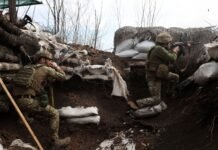Surrey Temple Vandalism: In recent times, the global landscape has seen a rise in old grudges rearing their heads, causing concern in communities across the world. A notable incident of such an upsurge took place in Surrey, a town in British Columbia, Canada. The Shri Mata Bhameshwari Durga temple, a place of spiritual refuge and community gathering, became a canvas for divisive sentiments. Its walls were smeared with anti-India and pro-Khalistan graffiti, raising alarm bells in the local and international community.
Surrey, like many Canadian towns, boasts a multicultural populace. It has always been a melting pot of cultures, ethnicities, and religions. Such acts of vandalism not only infringe upon the sanctity of a religious institution but also threaten to disrupt the peaceful coexistence of its diverse inhabitants.
The defacement of the temple came at a significant moment. It occurred just before the secessionist group, Sikhs for Justice (SFJ), declared their intent to “lock down” the Indian Consulate in Vancouver. This timing suggests a calculated move to stir up tensions and draw attention to their cause. The Sikhs for Justice have been advocating for the secession of Punjab, a northern state in India, and its establishment as the separate nation of Khalistan.
However, the act of defiling a religious institution raises concerns about the tactics employed by such secessionist movements. Rather than promoting dialogue and understanding, these actions seem to be aimed at sowing division and animosity.
Following the discovery of the graffiti, the Royal Canadian Mounted Police (RCMP) in Surrey were alerted. Swiftly taking note of the situation, they began investigations to bring the perpetrators to justice. Rohit, a spokesperson from the temple management, confirmed that the graffiti had been promptly removed. He emphasized the temple’s commitment to promoting harmony and understanding amongst all community members.
In light of these events, the Indian High Commission in Ottawa voiced its concerns to Canada’s foreign ministry, Global Affairs Canada. They flagged the potential threat to the Indian Consulate in Vancouver, especially given the SFJ’s vocal intent to disrupt its operations.
The backdrop to this drama was the cancellation of the Khalistan Referendum, which was scheduled for September 10th at a school in Surrey. The event had been promoted as an opportunity for pro-Khalistan elements to voice their opinions. However, alarm bells rang when promotional materials for the referendum featured a concerning image – an AK-47 machine gun. The Canadian authorities, valuing the safety and security of their citizens, decided to withdraw their permission for the event.
This chain of events raises several crucial questions about the nature of advocacy in today’s world. While every group has the right to champion its causes, there are boundaries of respect and decorum that should not be crossed. Using divisive tactics, especially those that infringe on the sanctity of religious institutions, runs the risk of alienating potential supporters.
Furthermore, the use of violence, or its imagery, as seen in the Khalistan Referendum promotional materials, is a cause for concern. It suggests a willingness to employ extreme measures to achieve one’s goals. Such strategies not only endanger the safety of the general public but also undermine the legitimacy of the group’s grievances.
In conclusion, the events in Surrey underline the importance of peaceful advocacy and dialogue. While groups like the SFJ have every right to voice their opinions, they must do so in a manner that respects the rights and sentiments of others. As the world grapples with numerous challenges, it is imperative that communities come together to foster understanding and unity, rather than division and animosity.































